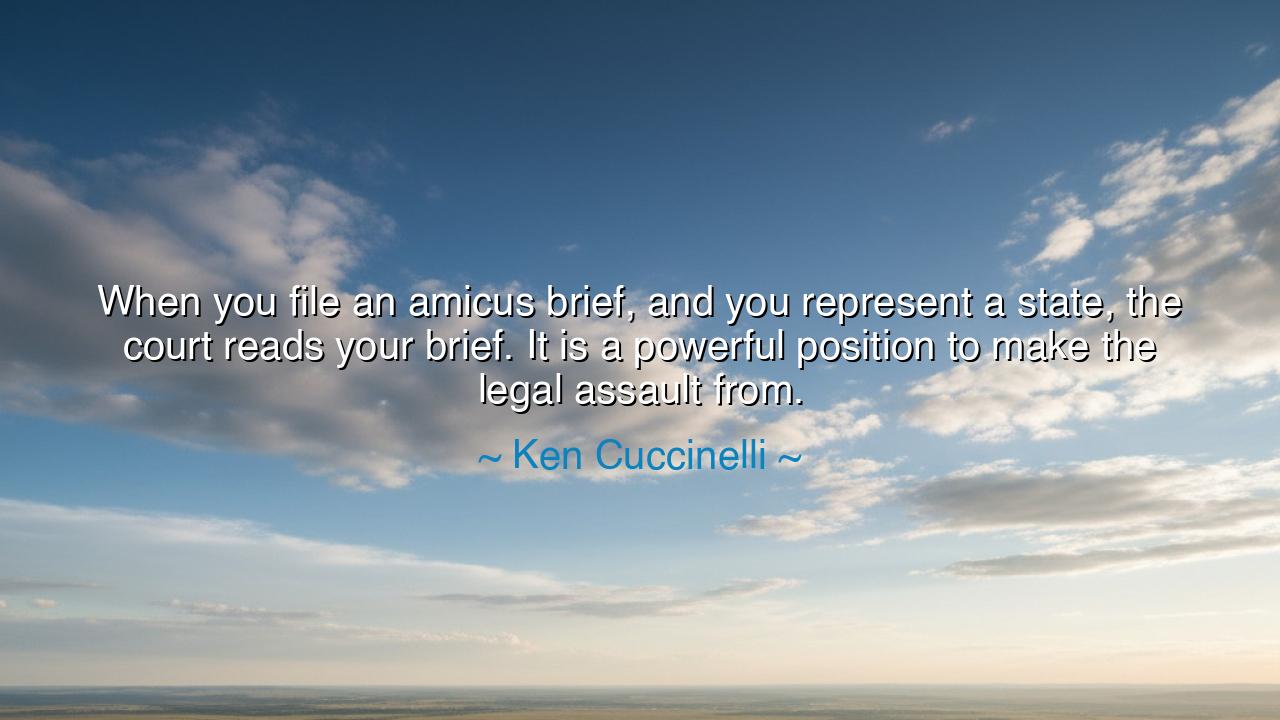
When you file an amicus brief, and you represent a state, the
When you file an amicus brief, and you represent a state, the court reads your brief. It is a powerful position to make the legal assault from.






The words of Ken Cuccinelli carry the weight of strategy and authority: “When you file an amicus brief, and you represent a state, the court reads your brief. It is a powerful position to make the legal assault from.” In this statement lies a recognition of the subtle power that flows through the channels of law — not the sword, not the mob, but the carefully reasoned argument, written with precision and addressed to the highest seats of judgment. Cuccinelli speaks to the enduring truth known since antiquity: that the pen, when wielded with authority, can move empires, shape society, and challenge the strongest of walls.
The origin of this insight is rooted in the American legal system, where the amicus curiae, or “friend of the court,” plays a role akin to an ancient adviser or counselor. In filing such a brief, especially on behalf of a state, one does not merely submit opinion — one presents a forceful legal argument that carries the weight of governance itself. The court, in turn, regards the brief with seriousness, for it represents not an individual, but the voice of a sovereign people, speaking through their chosen steward. In this way, a single document becomes a platform of influence, capable of shaping outcomes in cases of profound consequence.
Throughout history, counsel and advisement have wielded tremendous unseen power. In ancient Athens, the rhetoricians and sophists who advised magistrates could sway entire votes, not through violence, but through the clarity of argument and the appeal to reason. So too, in medieval courts, letters of counsel from kings or bishops — carefully reasoned, legally sound, and morally persuasive — could alter the course of justice. Cuccinelli’s words remind us that authority is often exercised through intellect and law, rather than force, and that even in modern times, the amicus brief is the descendant of those ancient instruments of influence.
Consider the modern example of the amicus brief filed in Brown v. Board of Education, the landmark 1954 case that ended legal segregation in public schools. Organizations, states, and civil rights groups submitted briefs, not as litigants, but as voices of reason, morality, and precedent. These briefs shaped the Supreme Court’s understanding of the societal and legal consequences of segregation. Like Cuccinelli notes, the position of writing on behalf of a state or organized body is powerful: the words carry weight beyond personal opinion, resonating with institutional authority and moral gravity.
Cuccinelli also highlights the concept of a “legal assault” — a phrase that evokes the deliberate, strategic application of law as a tool for change. In the hands of a skilled advocate, an amicus brief is not mere commentary; it is a spear, aimed with precision, designed to pierce arguments, illuminate weaknesses, and guide judgment. The ancient generals understood the same principle: to win a battle without unnecessary bloodshed, one must strike where the enemy is most vulnerable — in intellect, in morale, in structure. Here, the battlefield is not a field of arms, but the mind of the court.
Yet, with great power comes responsibility. To wield an amicus brief effectively is to honor both truth and law. It is not sufficient to write persuasively; one must write faithfully, ethically, and with respect for the gravity of the institution being addressed. Cuccinelli’s words remind us that influence in law is a sacred trust: the brief represents not only the state, but the broader ideals of justice. Misuse of this position can mislead, harm, or diminish the authority of the courts themselves, just as a poorly advised ruler can weaken an empire.
The lesson to be drawn, then, is enduring and universal. Knowledge and authority, when wielded thoughtfully, are the most potent instruments of change. Whether in law, politics, or moral discourse, one must use influence responsibly, crafting arguments with clarity, rigor, and integrity. To those who aspire to counsel or leadership, Cuccinelli’s words serve as a call: understand the weight of your voice, respect the structures you serve, and act with both strategy and conscience.
So remember this: in every age, the power of the written word, guided by authority and directed with wisdom, can shape history. The amicus brief, like the letters of ancient advisors or the treatises of philosophers, holds the potential to transform decisions, to guide nations, and to protect justice. Step boldly into that power, but temper it with humility, for to influence the law is to influence lives, and with lives comes a solemn responsibility — a responsibility that echoes from antiquity into the courts of today.






AAdministratorAdministrator
Welcome, honored guests. Please leave a comment, we will respond soon